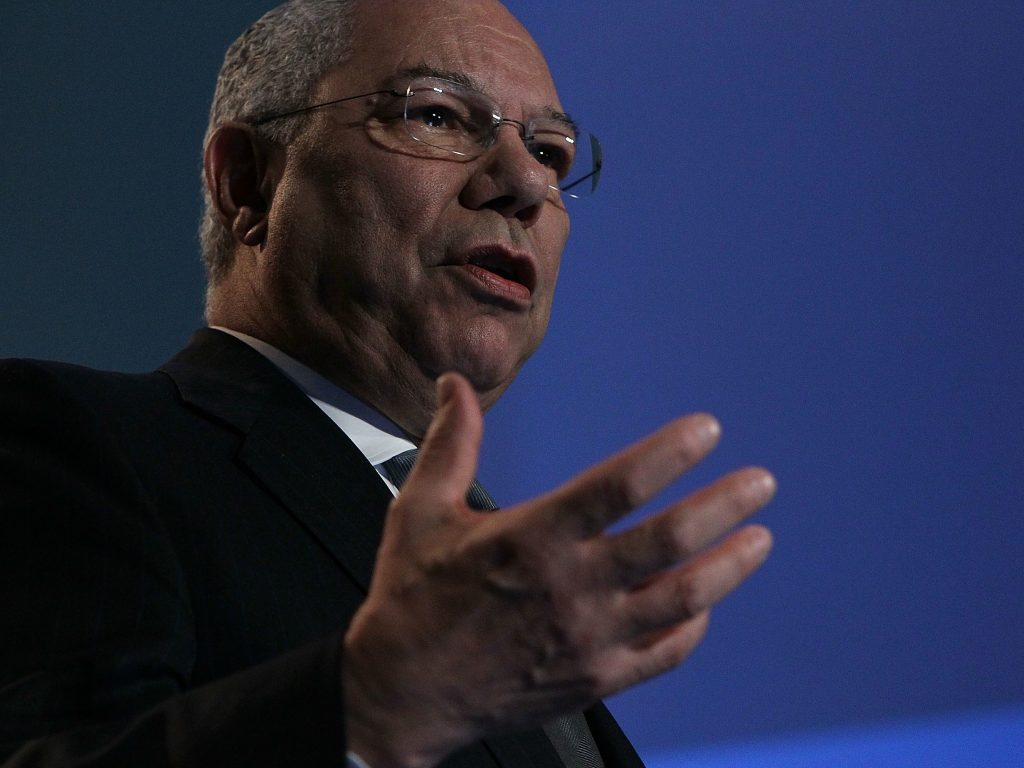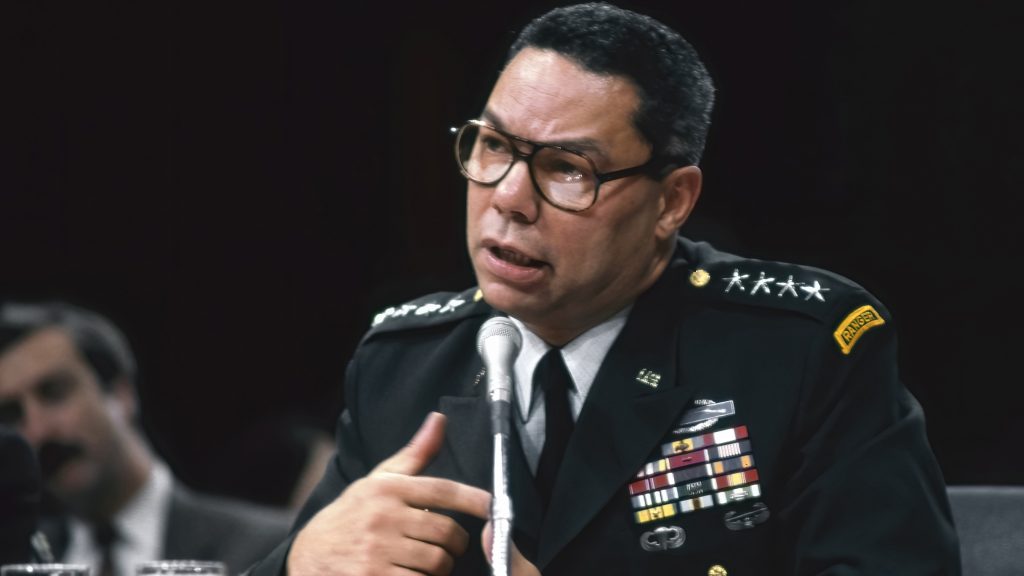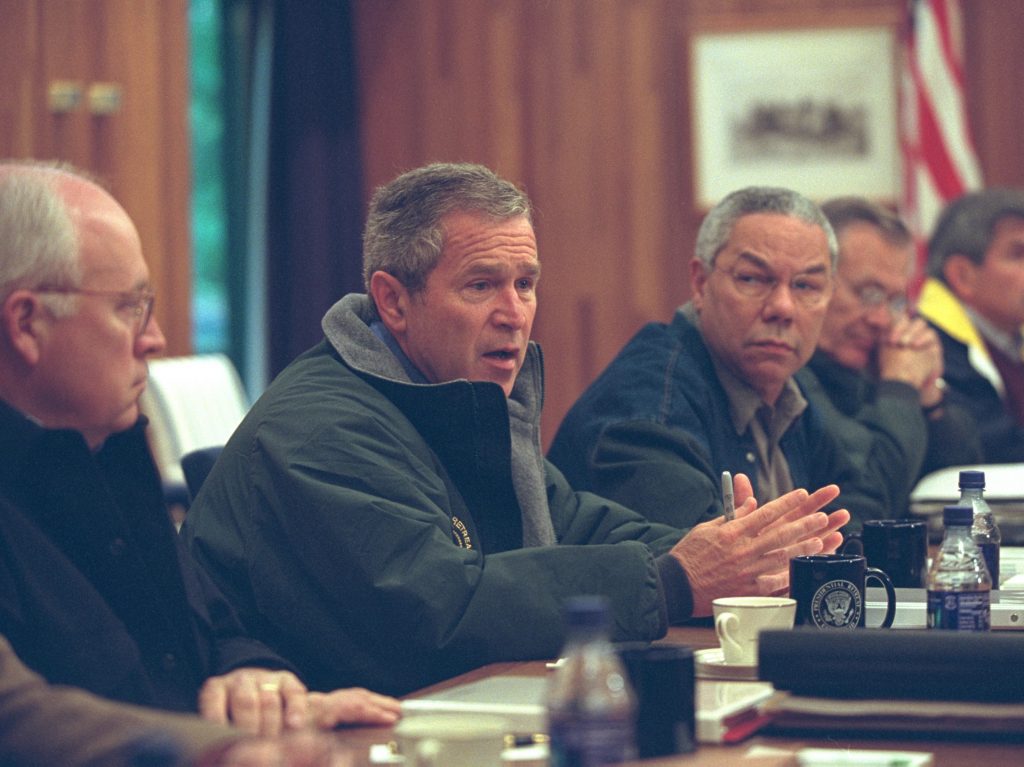News
Colin Powell, a former secretary of state, dies at 84
By: Scott Neuman | Don Gonyea | NPR
Posted on:
WASHINGTON, D.C. (NPR) — Colin Powell, who served as secretary of state during the presidency of George W. Bush and led the first Gulf War as chairman of the Joint Chiefs, has died at age 84 of complications from COVID-19, his family confirmed.
Powell, the first African American to serve in both of those senior posts, died Monday morning. They said that “he was fully vaccinated,” but it’s not clear what other underlying health issues may have played a part in his death.
“We want to thank the medical staff at Walter Reed National Medical Center for their caring treatment,” the family said in a Facebook post. “We have lost a remarkable and loving husband, father, grandfather and a great American.”

The Army helped Powell find his path
Powell, the son of Jamaican immigrants, was born in Harlem and grew up in a working class family in the South Bronx. In the Army, he found a culture where a Black man could find his own path — where race, background and income level didn’t define you, he told NPR in 2012.
“People have asked me, ‘What would you have done if you hadn’t gone into the Army?’ I’d say, ‘I’d probably be a bus driver, I don’t know,'” Powell said.
As a young Army officer, he served as an adviser in South Vietnam in the early 1960s. During that first tour, he believed the U.S. was in Southeast Asia “to save the world from communism,” he told C-SPAN in 1995.
But after a second tour in 1968, when the U.S. was at the height of its military involvement in Vietnam, he lost his early optimism.
“We weren’t sure how we were going to get out of this war, and we weren’t sure that we were prepared to make the investment that would be required to either win or get out with honor,” he said.

Vietnam forever informed his approach to foreign policy
He would remember the lessons of Vietnam as he rose through the ranks, eventually becoming chairman of the Joint Chiefs of Staff under then-President George H.W. Bush.
Powell came into the public consciousness during the first Gulf War when he advocated for overwhelming military force against Saddam Hussein’s Iraqi army, which had invaded Kuwait. His approach in the conflict came to be known as the “Powell doctrine.”
He was for years one of the most widely admired Americans. After retiring from the Army, he wrote a memoir and was later tapped by President George W. Bush to serve as secretary of state. Bush described Powell as a “tower of strength and common sense.”
In a statement after Powell’s death, Bush called him “a great public servant,” liked by presidents and “highly respected at home and abroad.”
“And most important, Colin was a family man and a friend,” he said.
But Powell’s defense of the 2003 invasion of Iraq and his presentation at the United Nations of evidence of weapons of mass destruction that turned out not to exist — drew widespread criticism and put a blemish on his reputation.
“It wasn’t just me making the case; everybody was making the case,” he told NPR’s Steve Inskeep in an interview in 2011. “Even though my presentation, in many ways, was flawed — there was a lot of correct analysis in that presentation — it was based on a national intelligence estimate that the Congress had asked for and the CIA had provided, which is even more categorical than my subsequent presentation as to the existence of weapons of mass destruction.”

Clark said that Powell “was a soldier at heart” and “had a magic with people.”
Powell was not a proponent of invading Iraq and did not see eye-to-eye with either Vice President Dick Cheney or Defense Secretary Donald Rumsfeld. During a meeting in 2002, Powell warned Bush of the consequences of invasion: “You break it, you’re going to own it,” he reportedly said.
In a 2011 memoir, Cheney said Powell did not always fully brief Bush. Powell responded to the criticism, calling Cheney’s remark a “cheap shot.”
Even so, Cheney released a statement on Monday saying he was “deeply saddened to learn that America has lost a leader and statesman.”
“General Powell had a remarkably distinguished career, and I was fortunate to work with him,” Cheney said. “He was a man who loved his country and served her long and well.”
He grew disenchanted with the GOP under Donald Trump
Although moderate by today’s standards, Powell was a nearly lifelong Republican, having served three GOP presidents, having also served as Ronald Reagan’s national security adviser.
But in 2008, he endorsed then-Democratic presidential nominee Barack Obama over Sen. John McCain, citing his concerns about the direction of the Republican Party at the time.
In 2016, he said he would not vote for Donald Trump and later called out the 45th president. “We have a Constitution. We have to follow that Constitution. And the president’s drifted away from it,” Powell said in 2020 after Trump threatened to use military force against Black Lives Matter protesters.
During the 2020 campaign, Powell said he would vote for Joe Biden, but it wasn’t until the Jan. 6 insurrection at the U.S. Capitol that the former secretary of state finally severed ties with the GOP.
“I can no longer call myself a fellow Republican,” he told CNN’s Fareed Zakaria. “I’m not a fellow of anything right now. I’m just a citizen who has voted Republican, voted Democrat throughout my entire career.”
“Right now, I’m just watching my country, and not concerned about parties,” he said.
9(MDU1ODUxOTA3MDE2MDQwNjY2NjEyM2Q3ZA000))

